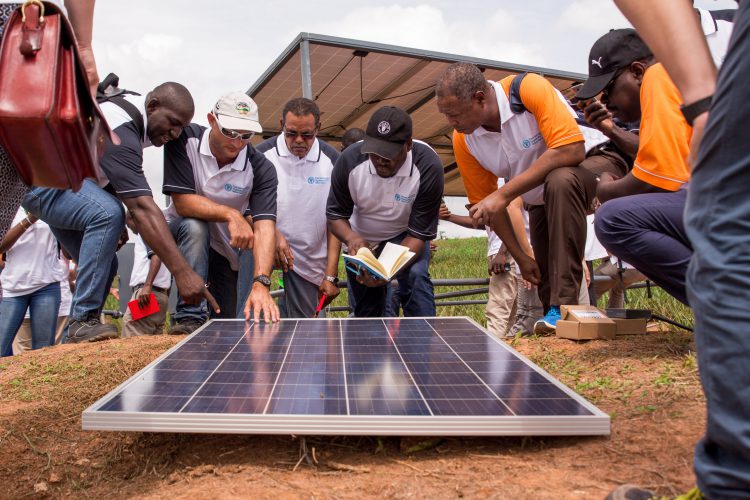A good irrigation system promotes better agricultural practice, which further adds to eliminating zero hunger. Solar power is a growing means of generating energy and power supply. Thus, in agriculture, solar power has become increasingly necessary for irrigation as a reliable, clean-energy solution for agricultural water management, especially in areas with high incident solar radiation. The core reason for using solar power/ the sun for irrigation is because, crops need a lot of water when the sun shines, and solar power produces a lot of energy when it is needed as it directly receives energy from the sun.
As regards, Solar-Powered Irrigation System (SPIS) has become a very important technology in agricultural. In recent time, SPIS technologies are becoming a viable option for many farmers, including smallholders. In rural areas, solar power can be a means of ensuring access to energy for agriculture, specifically for users in rural areas that lack either reliable access to electricity grids or where fuel is expensive and difficult to access. Other benefits may include increased access to water during dry-spells and dry seasons, and improvement of income, food and nutrition security– among others.
Thus, a comprehensive Toolbox on Solar-Powered Irrigation Systems (SPIS) for technical advisors was developed and a portfolio of projects that install SPIS, train users and advisors, assess impacts and develop business models was built up. To understand how solar powered irrigation is being implemented, a field visit to a farmland in Nsawam, Ghana (Groital) was conducted, to view the situation of the farmland and the system of water supply being used there. This visit gave in-site knowledge and understanding of the SPIS structure, implementation and use in the area.
During the explanation on the farmland and the irrigation process, the farm (Groital) CEO, Joshua Ayinbora said, “we realized that our farmland will survive with the consistency of water flow, thus we collaborated with GIZ who funded 60% of the project to install a solar-power irrigation system to our farm”. It can be said that there has been an advancement of agricultural produce since the installation of the Solar Power Irrigation System in the farmland.
Solar irrigation system works when the pumps used for transporting the water are equipped with solar cells. Here, the solar energy absorbed by the cells is converted into electrical energy that then feeds an electric motor driving the pump. Osman Sahanoon, CEO of Pumptech, the company that installed the pump said, “the irrigation system has been installed since May 2016 and it has had no issues since installation”. This shows that since installation, it has needed little/ no fix-up because of its durability.


Explaining how water is pumped to all parts of the farmland, given the size of the farmland, he also said, “We get water to all parts of the farm land by partitioning. We partitioned the farmland in such a way that we direct the pumped water to a section of the farmland, and once the water has circulated round that part of the farmland, we channel the pumping to another part, until all parts are well watered. With this method, we are able to get the water around the farmland in an easy and convenient way”.
However, the use of solar energy in agriculture is becoming increasingly popular and the energy produced from this renewable source can be used either on the farm or in the local power grid, providing the farmer with an additional income.
SPIS can help buffer the effects of drought and to overcome water stress during dry season when groundwater is the only available water source, or when surface water has to be hauled over long distances. When solar PV pumps replace water hauling, it can also free up a considerable amount of working time that can be invested in productive activities, e.g. dry season farming. Explaining which crops need more irrigation, Groital CEO said, “irrigation is needed more on vegetables than pineapple and it is more necessary to irrigate the farmland between December and March once a week”. This describes the nature of the farm and crops irrigation system.
The understanding of Solar-Powered Irrigation System is necessary, as this is a solution to water management in agriculture. SPIS can also reduce GHG emission from irrigated agriculture and enable low-emission irrigation development, thus, it should be integrated into strong regulatory frameworks on water conservation to ensure sustainable use of water resources and avoid over abstraction of groundwater.
Read more on the toolbox: https://energypedia.info/wiki/Toolbox_on_SPIS


Permalink
i want to start a solar energy businenss in our remote area in angola
please , how we can start
Permalink
Hi
How I can get a Solar-Powered Irrigation System in my village
Permalink
This is very interesting, You are a very skilled blogger. I’ve joined your rss feed and look forward to seeking more of your excellent post. Also, I’ve shared your web site in my social networks!
Permalink
i will like to make enquiry about solar?
Permalink
Very much interested in getting the solar water pumping system for my bulawayo plot and probable start abissness how do i go about